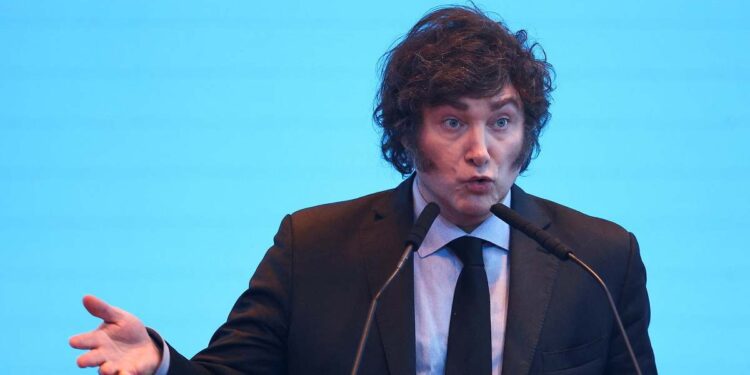The president of Argentina, Javier Milei, celebrated the achievement of “zero deficit” in the early hours of this Monday (Spanish time), a key goal of his ‘shock’ plan that has been achieved thanks to a drastic and unprecedented adjustment that has hit the real economy and is a source of conflict for the Government. The truth is that this controversial plan has achieved what seemed impossible: Argentina’s accounts have been balanced, the country risk has fallen sharply, bonds have risen in price, the peso has stabilized, and even inflation shows signs of moderation (within the extreme economic and financial severity that the country is experiencing).
“The fiscal surplus is the cornerstone from which we are building a new era of prosperity in Argentina,” Milei stated on Monday night, accompanied by his economic team in the presidential palace in Buenos Aires. “We are making possible the impossible even with most of the politicians, unions, media, and most economic actors against us.”
The South American nation registered a quarterly fiscal surplus of 0.2% of the gross domestic product at the beginning of the year, as well as a third consecutive monthly surplus in March, Milei said. The libertarian economist promised to continue with austerity because “inflation is theft and fiscal deficit is the cause of inflation.”
Argentine bonds have appreciated significantly, while investors awaited Milei’s announcement, leading gains in emerging markets on Monday. “Argentina remains a good deal,” Diego Ferro, founder of M2M Capital in New York, said over the phone after the president’s speech. But he warned that the surplus remains an intermediate step.
“What they achieved was impressive, but it was based on very short-term measures,” Ferro said. “Unless it becomes structural changes, it will probably become another ‘I told you so’ story that will end in tears.”
Milei, who took office on December 10, chose the national media network to announce the result of the public accounts in March, a piece of information that is usually reported through a simple press release and an Excel spreadsheet. An arid and complex information for the average citizen, but one that Milei, a professional economist, decided to place in prime time this Monday to highlight the conquest in just a few months of managing one of his campaign promises.
From a 6% deficit to surplus
“It is a feat of historical proportions worldwide,” highlighted the head of State in a message recorded at the Executive headquarters and supported by his economic team. When announcing his ‘shock’ plan last December to address the deep imbalances of the battered Argentine economy, Milei promised to close 2024 with a fiscal surplus, starting from a primary deficit equivalent to 2.9% of GDP and a negative financial result of 6% in 2023.
The result achieved in the first quarter of the year is remarkable: the accumulated fiscal surplus was 3.8 trillion pesos (3,959 million euros), equivalent to 0.6% of GDP. And the financial result (after debt interest payments) accumulated was positive by 1.13 trillion pesos, equivalent to 0.2% of GDP, something that had not been achieved since 2008. Without real growth in revenues, the result is explained by what Milei calls the ‘chainsaw’ effect (net expense cuts) and ‘blender’ (expenses that grow at rates lower than inflation, which was 287.9% year-on-year in March, resulting in a real decrease).
According to Milei, there was more ‘chainsaw’ than ‘blender’
In practice, drastic real cuts were made in transfers to the provinces, in allocations for education and health, a halt in public works investment, massive layoffs in the public administration, significant cuts in state subsidies for transportation, electricity, and gas, and pension adjustments well below the jump in inflation. The methodology to recover the promised balance in public accounts has led Milei’s Executive to strong tensions with the provincial governors – all of them being opposition politicians – who in many cases resorted to the Justice against the austerity measures.
Another important focus of conflict is with the university community, which promises to hold a massive march this Tuesday against cuts in public higher education funding. Teachers, healthcare workers, and public workers are increasing their measures of force, while the General Confederation of Labor, the largest labor union in the country, is preparing to carry out its second general strike on May 9 against Milei’s adjustment plan. “This is the final stretch of a heroic effort that we Argentines are making,” Milei asserted, claiming that the fiscal surplus is the only way to end the “inflationary hell.”
The adjustment, which the current president promised in the campaign would fall on the “political caste,” is being borne by the middle and lower income classes, whose incomes have lost by far the race against inflation, marginalizing thousands of people into poverty and plunging others into destitution.
Without purchasing power in households, consumption has plummeted, with economic activity in freefall due to the blow to the demand for goods and services. But while private economists project a contraction of 3.5% in GDP for 2024, Milei appeared optimistic this Monday. He stated that the recovery will come hand in hand with mining, hydrocarbons, and agriculture, real wage recovery, and private investment.


